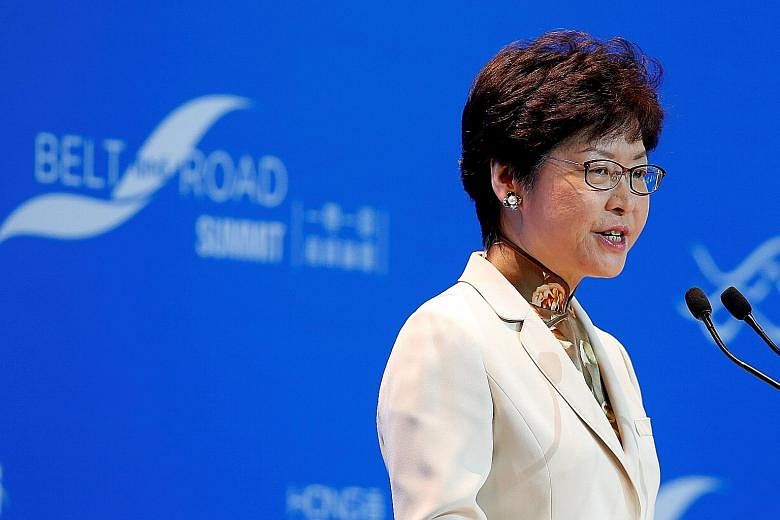HONG KONG • A new national security law, which had been put off after a massive protest demonstration, will be implemented "when the time is ripe", said the territory's Chief Executive Carrie Lam yesterday.
She did not give a timeframe but told reporters its implementation "must be carried out" completely when the "conditions are right".
Mrs Lam gave the response to the media on her return from Beijing, when asked if the government would hasten the process of introducing the new law, following a controversial talk on Tuesday by pro-independence activist Andy Chan Ho Tin at the Foreign Correspondents' Club (FCC).
She noted that her administration has been tasked to safeguard national security under Article 23 of the Basic Law, the city's mini-Constitution.
The Article requires Hong Kong to enact its own national security legislation to prohibit treason and subversion against Beijing.
In September 2002, it released its proposals to implement Article 23. And in February 2003, it introduced a National Security (Legislative Provisions) Bill to the Legislative Council, sparking an intense debate in the city on the potential impact of the new provisions on human rights, especially the right to freedom of expression and assembly.
It culminated in a massive demonstration on July 1, 2003, by half a million Hong Kongers who feared an erosion of civil liberties. The government later withdrew the proposed legislation.
In April this year, Mrs Lam said the city was still not ready for the new law even though Beijing officials, like liaison office chief Wang Zhimin, had intensified warnings that laws on offences such as treason and sedition were overdue and were needed to tackle independence advocacy.
Last month, she hinted the law would come sooner rather than later. She also said she would not "shelve" the issue. What she would do is to continue to create "the favourable condition" for implementing the legislation, she added, by improving public trust in the government.
But the Tuesday talk appears to have raised temperatures in Beijing, which had earlier asked the FCC to cancel the event.
The FCC turned down the request and reiterated that it neither endorses nor opposes the views of its speakers, who touch on a wide range of topics.
Also, in the two weeks leading up to the talk, political heavyweights, including the territory's former chief executive Leung Chun Ying and its last British governor Chris Patten, weighed in on the issue.
Mr Chan, whose unregistered Hong Kong National Party is facing a ban, had declared in his talk that the only way for Hong Kong to truly achieve democracy is independence.
He argued that Hong Kong was a colony of China and the "one country, two systems" model has failed.
Both the Hong Kong and China authorities condemned the talk, blasting it as a violation of the Basic Law and a direct affront to the national sovereignty, security and territorial integrity of the mainland.
The day after the talk, Beijing's top official handling Hong Kong and Macau affairs, Mr Zhang Xiao-ming, was reported to have said the FCC had broken the law by hosting an event involving Mr Chan.
Mr Zhang said that in allowing the talk by an activist calling for independence, the FCC had not just been "unfriendly" to China, but also "aided separatism".
Some political observers said the FCC saga is part of a calculated effort to prepare the city for the eventual promulgation of the hugely unpopular anti-subversion law.
Professor Willy Lam of the Chinese University of Hong Kong said past events, including the jailing of young activists and the latest FCC saga, "are part of a well-orchestrated, well-organised effort by Beijing to close the window on free speech, free assembly, free expression of wills, freedom of organisation and so forth, using the 'pro-independence movement' as a pretext".


